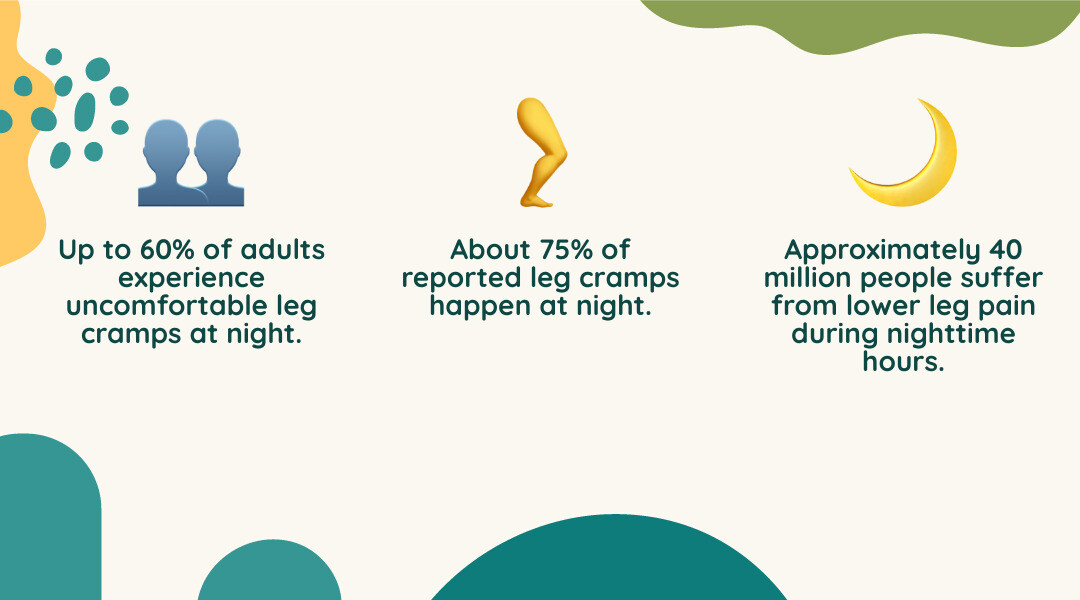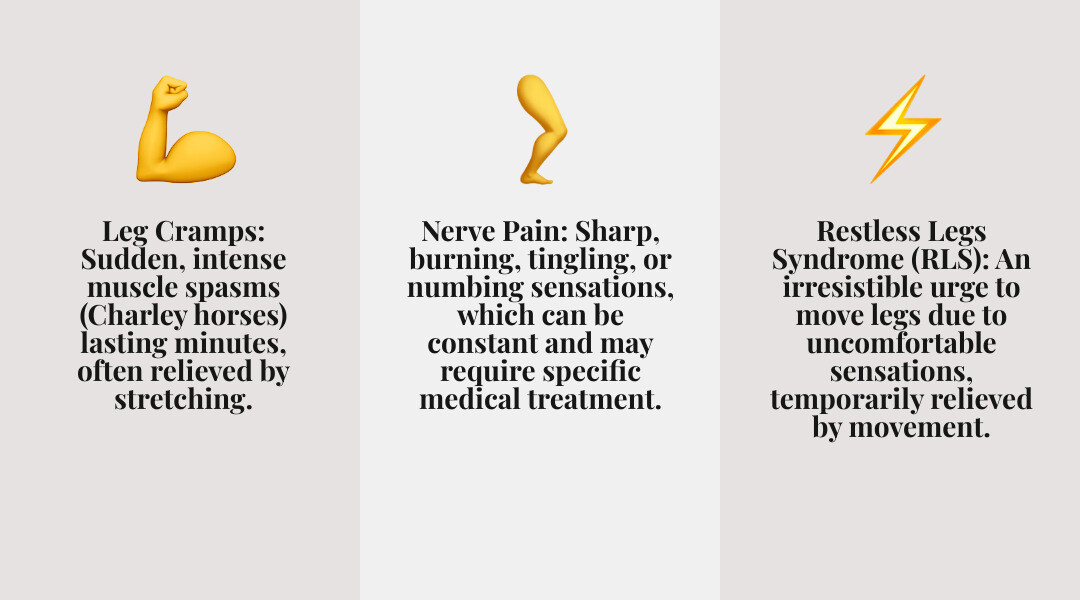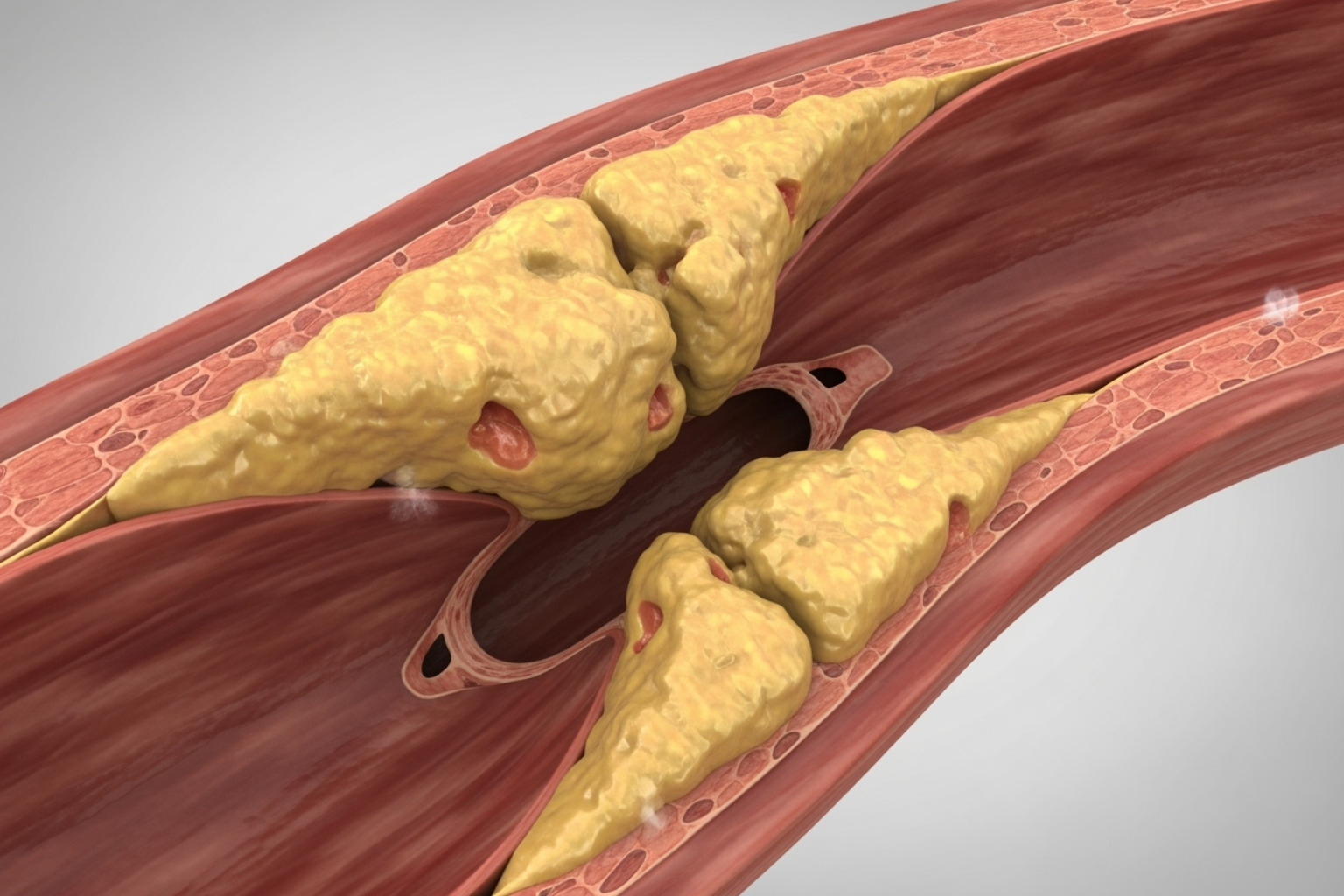Why Nighttime Leg Soreness Affects Millions
Leg soreness at night is a widespread problem that disrupts sleep and diminishes quality of life. If you've ever been jolted awake by a sudden cramp or struggled to sleep due to aching legs, you're not alone. The most common causes include muscle fatigue, nerve-related issues like sciatica, vascular problems such as poor circulation, and lifestyle factors.
Understanding the root cause is the first step toward finding effective relief.
The Scale of the Problem
Research shows that up to 60% of adults experience nighttime leg cramps, and millions suffer from lower leg pain after dark. In fact, about 3 out of 4 reported cases of leg cramps happen at night. For adults over 60, 33% experience a leg cramp at least once every two months, according to studies cited by the American Academy of Family Physicians.
Why This Matters
Nighttime leg soreness is more than a temporary nuisance. It can disrupt your sleep cycle, leading to daytime fatigue, and may signal underlying health conditions like PAD or diabetes-related nerve damage. The good news is that many causes can be managed with home remedies, lifestyle changes, and targeted solutions like topical pain relief creams.
About the Author
I'm Tony Enrico, and my career is dedicated to helping people find natural relief from muscle and nerve pain. Through my work with Neuropasil, I've seen how addressing leg soreness at night can transform sleep and well-being. Our goal is to help 1 million people across North America manage their pain effectively by 2028.
In this guide, we'll explore the causes of nighttime leg discomfort, immediate relief strategies, and long-term prevention methods.

What You'll Learn
In the sections ahead, we'll cover:
- The main categories of causes: musculoskeletal, neurological, and vascular
- How to distinguish between different types of pain
- Immediate home remedies and lifestyle changes for prevention
- When to seek medical help
Let's start by unpacking why your legs hurt at night.
Why Do My Legs Hurt at Night? Unpacking the Common Causes
That nagging leg soreness at night often stems from a mix of factors. We can group the causes into three main categories: musculoskeletal (muscles and bones), neurological (nerves), and vascular (blood flow). Everyday factors like dehydration, nutrient deficiencies, or certain medications also play a significant role.
Musculoskeletal Causes
Pain originating from muscles and bones is a frequent culprit, especially after a physically demanding day.
- Muscle Fatigue and Overuse: After prolonged standing, walking, or exercise, your muscles are simply worn out, leading to stiffness and aches that become more noticeable at rest.
- Strains and Tendonitis: A muscle strain (stretched or torn fibers) or tendonitis (inflamed tendon) can cause a persistent ache that feels more pronounced at night.
- Arthritis: Joint inflammation from conditions like osteoarthritis can cause pain that radiates down the legs, often worsening at night.
- Leg Cramps ("Charley Horses"): These sudden, intense muscle spasms in the calf, foot, or thigh are a primary cause of waking up at night. They can be triggered by muscle fatigue, dehydration, or an electrolyte imbalance. Up to 60% of adults experience them, and about 75% of leg cramps occur at night. For more on this, see our guide on Muscle Aches and this research here.
Neurological and Nerve-Related Pain
Sometimes, the problem lies within the nervous system, causing a different type of discomfort.
- Restless Legs Syndrome (RLS): This condition causes an irresistible urge to move your legs, accompanied by aching or creepy-crawly sensations. Symptoms are typically worst at rest, especially at night. Learn more from the National Institute of Neurological Disorders and Stroke about Restless Legs Syndrome.
- Sciatica and Nerve Compression: Pressure on the sciatic nerve can cause sharp, shooting pain down the leg, which may worsen with certain sleeping positions. Other compressed nerves can cause similar radiating pain, numbness, or weakness.
- Diabetic Neuropathy: High blood sugar can damage nerves, leading to burning pain, tingling, or numbness in the legs and feet, often disrupting sleep. The Mayo Clinic explains that Diabetic neuropathy can affect up to half of all people with diabetes.
- Fibromyalgia: This chronic condition involves widespread muscle pain, fatigue, and sleep issues. For those with fibromyalgia, nighttime leg pain can feel like a deep ache or cramp. Find ways to soothe this discomfort with our insights on nerve pain relief.
Distinguishing Leg Cramps from Other Pains
Knowing the difference between types of pain can help you find the right relief. Here’s a quick comparison:

| Feature | Leg Cramps | Restless Legs Syndrome (RLS) | Nerve Pain (e.g., Sciatica, Neuropathy) |
|---|---|---|---|
| Sensation | Sudden, intense muscle spasm | Uncomfortable urge to move; aching, tingling | Sharp, shooting, burning, electric-like |
| Duration | Seconds to minutes | Can persist for hours | Often constant or intermittent |
| Relief | Stretching, massage, walking | Movement (walking, stretching) | Varies; may require medication or therapy |
| Associated Symptoms | Muscle tightness, visible knot | Worse with rest, improves with activity | Weakness, numbness, radiating pain |
| Common Triggers | Dehydration, fatigue, electrolyte imbalance | Inactivity, iron deficiency, genetics | Nerve compression, inflammation, injury |
A Deeper Look: Vascular Conditions and Leg Soreness at Night
Sometimes, the culprit behind your leg soreness at night is your circulatory system. When blood flow is compromised, your legs don't get the oxygen they need, leading to pain that often becomes more noticeable when you lie down to rest.

Peripheral Artery Disease (PAD)
Peripheral Artery Disease (PAD) occurs when arteries in the legs narrow due to plaque buildup (atherosclerosis), reducing blood flow. During the day, gravity helps push blood down to your legs. When you lie down at night, you lose that assistance, and the reduced blood flow can cause significant aching or cramping, known as rest pain. This is a sign of more advanced PAD. Other symptoms include leg numbness, coldness, shiny skin, or slow-healing sores on your feet. You can learn more from the American Heart Association about What is Peripheral Artery Disease (PAD)?.
Other Circulatory Issues
Vein-related problems can also contribute to leg soreness at night.
Chronic Venous Insufficiency (CVI): This happens when valves in your leg veins don't work properly, allowing blood to pool. This causes a heavy, aching, and swollen feeling that can be more bothersome when you lie down. Varicose veins are often a visible symptom of CVI.
Deep Vein Thrombosis (DVT): This is a serious condition where a blood clot forms in a deep vein, usually in the leg. DVT can cause significant pain, swelling, and warmth that may feel more pronounced at night. If you suspect a DVT, seek immediate medical attention. The CDC provides important Information on Deep Vein Thrombosis.
Immediate Home Remedies for Soothing Sore Legs
When leg soreness at night strikes, you need relief fast. These simple and effective home remedies can help ease your discomfort and get you back to sleep.
Stretching and Movement
Gentle movement is often the most effective solution for a cramp. Try these simple stretches:
- Calf Stretch: Straighten your leg and gently pull your toes toward your shin. Hold for 20-30 seconds.
- Ankle Rotations: Slowly rotate your ankles clockwise and counterclockwise to improve circulation.
- Light Walk: Getting out of bed to walk around the room for a few minutes can encourage blood flow and release cramped muscles.
To prevent pain, try a simple pre-bed routine of calf, hamstring, and quadriceps stretches.
Temperature Therapy and Massage
Heat and cold can be powerful tools against nighttime leg soreness.
- Warmth: A warm bath, shower, or heating pad before bed can relax tense muscles and increase blood flow, helping muscles recover.
- Cold: If you have swelling, a cold compress can help. It constricts blood vessels, which reduces inflammation and provides a numbing effect.
- Massage: Use your hands or a foam roller to apply gentle pressure to sore areas. This helps release muscle knots and improve circulation. For more tips, see our guide on relieving sore muscles.
Neuropasil Nerve Pain Relief Cream
For targeted, fast-acting relief from the nerve and muscle pain that causes leg soreness at night, we developed Neuropasil Nerve Pain Relief Cream.
Neuropasil works using a blend of natural ingredients. Menthol provides an immediate cooling sensation that eases discomfort, while Aloe and Urea soothe the skin and help the active ingredients penetrate deeply. This combination delivers relief you can feel within minutes.
Our customers use Neuropasil for a wide range of conditions causing nighttime leg pain, including neuropathy, sciatica, fibromyalgia, strains, cramps, and aching feet. Athletes also rely on it for muscle recovery.
Unlike products that just mask pain, our cream works directly where you apply it, providing lasting, soothing relief. Applying Neuropasil before bed can help you sleep through the night without pain interruptions. For more information, explore our guide on the Best Pain Relief Creams for Muscle Pain.
Lifestyle Changes for Long-Term Prevention
While immediate remedies are helpful, long-term prevention of leg soreness at night involves looking at the bigger picture. Thoughtful lifestyle changes can dramatically reduce nighttime leg pain and benefit your overall health.
Diet and Hydration
- Stay Hydrated: Dehydration is a major cause of muscle cramps. Drink water consistently throughout the day to ensure your muscles can function properly.
- Balance Electrolytes: Ensure you get enough magnesium, potassium, and calcium, as these minerals are vital for muscle function. Good sources include leafy greens (magnesium), bananas (potassium), and dairy or fortified foods (calcium).
- Limit Alcohol and Caffeine: Both can lead to dehydration and disrupt your electrolyte balance, increasing the risk of cramps. Avoid them in the hours before bed.
Exercise and Activity
- Engage in Regular, Moderate Exercise: Activities like walking, swimming, or biking improve circulation and strengthen leg muscles, making them less prone to pain. Aim for 30 minutes most days of the week.
- Avoid Prolonged Stillness: If you sit or stand for long periods, take frequent breaks to walk and stretch. This prevents blood from pooling and muscles from stiffening. Find more tips in our guide on using physical activity to relieve muscle aches.
- Warm-Up and Cool-Down: Always prepare your muscles for exercise with a warm-up and help them recover with a cool-down to prevent stiffness and soreness.
Optimizing Your Sleep Environment
- Check Your Mattress and Posture: A supportive mattress is key. Sleeping on your side with a pillow between your knees can help align your spine and reduce pressure on your legs.
- Lift Your Legs: Propping your legs on a pillow can improve circulation and reduce swelling, especially if you've been on your feet all day.
- Loosen Heavy Blankets: Tight or heavy covers can press your feet into a pointed position, shortening calf muscles and triggering cramps. Keep blankets loose at the foot of the bed.
When to Seek Medical Help for Leg Soreness at Night
While home remedies and lifestyle changes are effective for many, some symptoms warrant a visit to a healthcare professional. Persistent leg soreness at night can sometimes signal a more serious underlying issue.
You should seek medical advice if you experience any of the following:
- Severe, unbearable, or worsening pain that doesn't improve with home care.
- Pain that consistently disrupts your sleep and affects your daily life.
- Swelling, redness, or warmth in just one leg, as this could indicate a blood clot (DVT).
- New or worsening numbness, tingling, or weakness in your leg or foot.
- Changes in skin color (paleness or a bluish tint) or sores that won't heal.
- Pain that began after an injury or prevents you from bearing weight.
- Accompanying symptoms like fever or chills.
For more guidance, the Mayo Clinic offers insights on when to see a doctor.
A doctor can perform a physical exam and may recommend diagnostic tests like blood work or an ultrasound to identify the root cause. Treatment options depend on the diagnosis and may include prescription medications, physical therapy, or, in some cases, minimally invasive procedures. Early diagnosis is key to preventing complications and improving your quality of life.
Frequently Asked Questions about Nighttime Leg Pain
Here are concise answers to some of the most common questions about leg soreness at night.
Why does leg pain seem to get worse when I lie down?
Several factors contribute to this. At night, with fewer distractions, you're more aware of your body's signals. Physically, when you lie down, you lose the help of gravity for blood flow, which can worsen pain from conditions like Peripheral Artery Disease (PAD). Certain sleeping positions can also put pressure on nerves, aggravating issues like sciatica. Finally, some conditions, such as Restless Legs Syndrome (RLS), are naturally more active during periods of rest.
Can a vitamin deficiency cause leg soreness at night?
Yes. Deficiencies in key electrolytes like magnesium, potassium, and calcium are a common cause of muscle cramps, as noted by sources like the Mayo Clinic. Additionally, as explained by the National Institute of Neurological Disorders and Stroke, iron deficiency is strongly linked to Restless Legs Syndrome (RLS) because iron is essential for producing dopamine, a brain chemical that helps regulate movement. If you suspect a deficiency, consult a healthcare provider for testing and guidance.
How can I tell if my leg pain is a muscle cramp or something more serious like a blood clot?
This is a critical distinction. While both can cause leg pain, their symptoms are very different. When in doubt, or if you suspect a blood clot, seek immediate medical attention.
A Muscle Cramp typically involves:
- A sudden, sharp, involuntary muscle contraction.
- A duration of seconds to a few minutes.
- Relief from stretching, massage, or walking.
- A possible visible or palpable knot in the muscle.
A Blood Clot (DVT) is more likely if you have:
- Persistent, throbbing pain, usually in one leg only.
- Significant swelling in the affected leg.
- Redness or discoloration of the skin.
- A feeling of warmth in the painful area.
- Little to no relief from typical cramp remedies.
Conclusion: Reclaim Your Restful Nights
Leg soreness at night is a common and disruptive issue, but it's one you can actively manage. As we've explored, the causes range from simple muscle fatigue to more complex nerve and circulatory conditions. The most important takeaway is that you have the power to find relief.
Start with the immediate strategies we've discussed: gentle stretching, temperature therapy, and targeted solutions like Neuropasil Nerve Pain Relief Cream for fast comfort when you need it most. These can help you get back to sleep without tossing and turning.
For long-term prevention, accept the lifestyle changes that address the root causes. Staying hydrated, eating a balanced diet, getting regular exercise, and creating a sleep-friendly environment are foundational steps toward reducing nighttime pain.
However, always listen to your body. If you experience severe pain, swelling in one leg, numbness, or other warning signs, please consult a doctor. Early diagnosis of conditions like DVT or advanced PAD is crucial.
At Neuropasil, our mission is to help you manage pain effectively so you can live better. You deserve restful, uninterrupted sleep. Don't let leg pain steal another night.
Ready to take the first step? Explore our solutions for muscle and nerve pain and reclaim your nights.
References
Throughout this guide, we have referenced information from credible, evidence-based sources to ensure accuracy. For further reading, we encourage you to explore the resources below and consult with your healthcare provider for personalized advice.
- American Academy of Family Physicians. (2012). Nocturnal Leg Cramps. Retrieved from https://www.aafp.org/pubs/afp/issues/2012/0815/p350.html
- American Heart Association. (n.d.). About Peripheral Artery Disease (PAD). Retrieved from https://www.heart.org/en/health-topics/peripheral-artery-disease/about-peripheral-artery-disease-pad
- Arthritis Foundation. (n.d.). Fibromyalgia. Retrieved from https://www.arthritis.org/diseases/fibromyalgia
- Centers for Disease Control and Prevention. (n.d.). Deep Vein Thrombosis and Pulmonary Embolism. Retrieved from https://wwwnc.cdc.gov/travel/yellowbook/2024/air-land-sea/deep-vein-thrombosis-and-pulmonary-embolism
- Mayo Clinic. (n.d.). Diabetic neuropathy. Retrieved from https://www.mayoclinic.org/diseases-conditions/diabetic-neuropathy/symptoms-causes/syc-20371580
- Mayo Clinic. (n.d.). Night leg cramps: When to see a doctor. Retrieved from https://www.mayoclinic.org/symptoms/night-leg-cramps/basics/when-to-see-doctor/sym-20050813
- National Institute of Neurological Disorders and Stroke. (n.d.). Restless Legs Syndrome Fact Sheet. Retrieved from https://www.ninds.nih.gov/health-information/disorders/restless-legs-syndrome
Neuropasil Resources:














